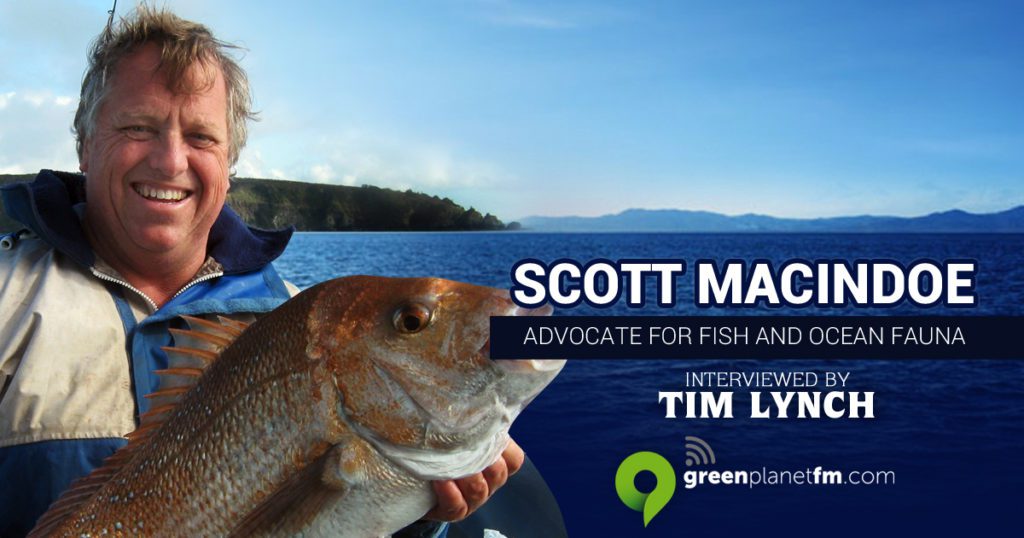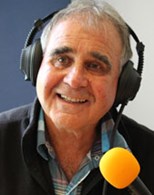
He is an active environmentalist, a good fisherman, a talented networker, a successful businessman, a green-fingered gardener & a loving family man.
“We have to claim our oceans and fisheries back before it is too late.”
There are multiple challenges to our fisheries here in NZ. We all know that due to industrial netting, fish numbers are falling, some spectacularly and this is happening both globally and locally. This also includes dwindling stocks of crustaceans as well as shellfish. At the same time we are having to deal with poorer water quality such as increasing acidic levels as well as an increase in the overall NZ population especially in Auckland who are keen consumers of fish.
This is intensifying pressure on the local commons, which translates to the area of sea that all fish-life inhabit and that for the last so many thousands of years there has been a customary right, for anyone to go down to the beach or get into a boat and catch a fish or three, to feed their family and friends.
This interview is in many ways is an exposé of the Fishing Industry in NZ, which is the fourth largest fisheries in area on our planet!
This is how Legasea came into being: As a fund raising, resourcing organisation that obtains good reliable consistent information of what fish we have in our waters … and how we can keep healthy fish in our waters for the foreseeable future.
In the first few minutes of this interview Scott mentions how Maori for the last 800 years or so had customary rights that allowed them to go down to the sea and catch fish, kai moana, for their family and also visitors who were staying at their pa or marae, and that this was a very large part of their culture.
Today, throughout NZ there are about 7% of fishermen who join clubs, however, most just get in their small boat or go down to the beach and catch fish, often every few weeks or even weekly.
About 600,000 NZers are fishing on a regular basis … approximately 200,000 in the greater Hauraki Gulf or Auckland Area.
However, things are changing.
We the NZ public are being constantly told that there is an arm wrestle of a war between recreational and commercial fishermen - which is not the case at all. It’s because of the Ministry of Primary Industries who are in partnership with NZ’s ‘primary industries’ are basically looking at doubling the exports of primary products by the year 2025 that’s their mission - fishing, farming, forestry, viticulture, aquaculture, insatiable harvesting or extracting - which is something like $80 million a day extra, to meet that target, so as to feed out fairly out of control consumer habits.
The knock on effect of this is smaller bag reductions and increases in sizes of fish that can be taken, by recreational fishermen, so this is about allocations between the commercial and non commercial sector.
Overall, only about 5% of the fish caught in Aotearoa are caught non commercially. In the inshore fisheries there are only a handful of fisheries where the recreational catch is more than the commercial sector.
Area 1 North Cape to East Cape of NZ.
Snapper - Maori name Tumare, the commercial sector land 4,500 tonnes per year and recreational land 3.500 tonnes. Stats (2013) which have gone down significantly since then - including lack of availability of fish.
We catch all species nationwide per annum at 10,000 tonnes of which 4.500 are snapper.
Note that 2,500 tonnes of snapper are sold to Australia at $9.00 per kilo as plate size NZ snapper. 25,26,27,28,29 centimetre snapper, these are very small. Note 30 centimetres and over is the legal size you are now allowed to take in the Auckland area now.
Kawai sold equal 1500 tonnes to Africa to the Cameroon, Côte d'Ivoire, & Ghana for $1.00 a kilo.
10s of thousands of tonnes into Australia for less than a $1.00 a kilo.
2,3,400 tonnes a year to Australia $1.28 as pet food and crayfish bait.
Fish are being dumped because they are too big, to small, wrong quota, bruised - it’s been going on for years.
Scott asked to mention www.Whatsfishingworth.co.nz = more fish in the water is their catch cry … Stewardship and best practice = ending the nonsense of bulk harvesting and bottom trawling, seining and dredging, that is rife in this country.
This is a tough interview for listeners … “due to its complexity - fisheries management and marine protection are abstract and complex concepts, they are disempowering because they are huge” (Jeanette Fitzsimons ex Green MP words.) The immensity of it puts people off from getting to grips with it. Remember, people go fishing just to get away from all of our head tripping complexities!
Scott mentions that many people often wait until their entire life goes by, before they realise the true joy of what it feels to be out on the water in tune with nature.
Covering:
www.Freefishheads.co.nz for a registry of giving away unwanted fish heads and frames to anyone in close proximity. A very good initiative, where people can go on line and ‘hook-up, with someone who has spare fish heads that they do not want to waste.
Scott says in relation to sharing fish heads: Utilisation in this case is conservation, sharing and caring, self respect, knowing that you have done the right thing.
He talks about the serial depletion of our fish stocks, being a phrase to describe what has happened to some of our fish. Huge numbers of hapuka were living off Flat Rock off Kawau Island, big fat gurnard off Motuora near Kawau were easily caught, now there is nothing.
Scott uses the case of the cod collapse in Newfoundland in Canada. As the fish disappear we get faster, better vessels, more high tech, sonar and electronics, a lot adapted from military tech, like GPS, pin pointing fishing spots and we can vitally choose what fish we want to take as the screens shows the sea floor with all fish being exposed. It’s like shooting fish in a barrel.
So our fishermen are so high teched up that they are now finding there are less and less fish.
Scott then mentions Aotearoan Maori vernacular of manaakitanga (caring) and kaitiakitanga (stewardship).
Plus, Tino rangatiratanga being the principle of relative autonomy – the goal is to gain relative control over one's own life and cultural well-being. That to many interpretations means ‘undisturbed possession' of lands, fauna and flora.
This is particularly important as to halting the destructive bottom trawling methods of laying waste to the ocean floor here in NZ and not just overseas. We have no idea what-so-ever of what damage this invasive trawling gear is doing to the underwater world.
Traditionally NZ trawlers even caught crayfish by this environmentally wasteful method.
Today, there are huge problems with commercial catch operations being basically censored from the public domain due to vested interests. Though more observers are being placed on boats and cameras deployed to see what is being caught or dispatched over the side, there is very little public information seeing the light of day, because it is all secret.
There are certain ‘gag’ orders, where those in the industry are forced to keep their mouth shut on certain issues, that if certain information was exposed in the public domain this would have gigantic repercussions, hence gag orders, that are becoming more and more predominant in our society - across the board!
Listen to an exposé where a Government department colludes with one of the biggest fishing fleets in NZ to greenwash ocean bottom trawling, and sneakily defect criticism away from their environmentally destructive fishing methods.
Whereas in Iceland the opposite is true. The people of this dynamic little country see that everything is in the public interest and that all information is published and nothing kept in the dark, which is not how it is in New Zealand.
Covering the Treaty of Waitangi and some very interesting happenings.
Scott talks about restored abundance of our fisheries as against the sustained depletion of our fisheries at the hands of Government and Fishing conglomerates. This Government sanctioned quota management system is all about collapsing the NZ fisheries. Via maximum sustainable yield. It’s the yield they want to sustain, not the fisheries!
We have to stop killing small fish, stop wasting juveniles we need to start planning for the future of a fast growing Auckland population.
Because as it is, recreational fishermen have been swept aside by decision makers.
This is a very telling interview, by a very coherent and clear communicator.
The future of fish in NZ waters is now up for debate throughout the country.
http://tvnz.co.nz/breakfast-news/fish-dumping-silence-no-longer-option-video-6237964
In 2013, it was estimated that 2 million snapper were caught and injured, before being thrown overboard as being too small.
